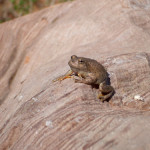At Frogs Are Green, we’ve always been interested in the interconnections between frogs and the Earth. How is climate change affecting amphibian populations? Are we listening to what frogs are telling us about the health of our planet?
Recently, we read an intriguing article in the Deccan Herald (India), about how a team of scientists in India are literally listening to frogs to understand the effect of climate change on amphibian populations.
Three scientists, K.S. Seshadri with T. Ganesh, and S. Devy, were doing research 100 feet above the ground in the canopy of the evergreen forest in the Kalakad Mundanthurai Tiger Reserve. While getting drenched with rain, they heard a cacophony of frog songs. Intrigued by the songs that the rains triggered, they initiated a program to study frog calls to both monitor populations and to study the affect of climate change on frogs.

Volunteer examines the monkey-proof enclosure for equipment to record frog calls. Photo credit: K. S. Seshadri
Amphibian Meterologists
Frogs can tell us a lot about the weather. Their skin is extremely thin and sensitive; they respond to even small changes in atmospheric moisture and temperature. The scientists reasoned that an analysis of sound recordings, combined with readings from climate data loggers, could help improve our understanding of the impact of climate change.
Climate change seems to underlie many of the threats facing frogs worldwide. By monitoring the frog calls, an activity calendar for each of the indicator species can be made. This long-term monitoring will be invaluable in understanding the greater impact of climate change and also might help to save frog species.
As the Deccan Herald put it: “Will the croak alarm finally wake us from our ignorant slumber? The answer lies in the future.”
For more information:
“What Frogs Tell Us About the Planet,” Decclan Herald, India
“Frog song and climate science,” Ashoka Trust for Research in Ecology and the Environment





